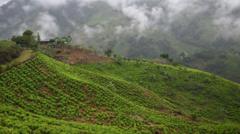In a dramatic turn of events, dozens of soldiers in Colombia have been kidnapped by groups of locals in a region notorious for cocaine production, revealing the deep entanglement of civilians with the narcotics trade and rebel groups.
Military in Colombia Faces Kidnapping Crisis Amid Cocaine Trade Struggles

Military in Colombia Faces Kidnapping Crisis Amid Cocaine Trade Struggles
57 soldiers abducted by locals in the Micay Canyon tied to ongoing conflict with rebel factions.
In the turbulent Micay Canyon area of Colombia's southwest, military officials reported that 57 of their soldiers were seized by local civilians over the weekend. The abductions occurred on Saturday and Sunday when 31 soldiers were initially taken, followed by 26 more, allegedly driven by pressures from dissidents of the Farc rebel group, which is known for participating in the country's long-standing conflict. Brigadier General Federico Alberto Mejía condemned the incident, labeling it outright kidnapping.
Local reports suggest the kidnappings could be connected to the actions of the EMC, a dissident faction that represents the largest splinter group from Farc. The EMC has remained silent on the matter. Colombian General Erik Rodríguez detailed that the incident was sparked by the arrest of a suspected rebel, which led to the soldiers being surrounded during an attempted extraction operation.
As negotiations commence for the soldiers' release, it's emphasized that all the captives are held in a single location. The Micay Canyon’s geography is pivotal for drug trafficking, serving as a pathway for cocaine shipments to Pacific ports, which then reach international markets.
The Colombian military has maintained a presence in the region to engage in what it describes as "constant patrols" to neutralize armed groups. However, the overwhelming majority—estimated over 90%—of the area's locals depend on coca crop cultivation for their livelihood, linking the soldiers' presence directly to threats against the lucrative cocaine industry.
Despite ongoing peace discussions with the EMC faction initiated by President Gustavo Petro's government, the dialogue has been marred by internal strife, leading to split factions and increased criminal activities, including extortion and illegal trafficking.
Earlier incidents involving targeted attacks on security forces have claimed numerous lives, signaling that tensions between the military, local populations, and rebel groups continue to escalate perilously.
Local reports suggest the kidnappings could be connected to the actions of the EMC, a dissident faction that represents the largest splinter group from Farc. The EMC has remained silent on the matter. Colombian General Erik Rodríguez detailed that the incident was sparked by the arrest of a suspected rebel, which led to the soldiers being surrounded during an attempted extraction operation.
As negotiations commence for the soldiers' release, it's emphasized that all the captives are held in a single location. The Micay Canyon’s geography is pivotal for drug trafficking, serving as a pathway for cocaine shipments to Pacific ports, which then reach international markets.
The Colombian military has maintained a presence in the region to engage in what it describes as "constant patrols" to neutralize armed groups. However, the overwhelming majority—estimated over 90%—of the area's locals depend on coca crop cultivation for their livelihood, linking the soldiers' presence directly to threats against the lucrative cocaine industry.
Despite ongoing peace discussions with the EMC faction initiated by President Gustavo Petro's government, the dialogue has been marred by internal strife, leading to split factions and increased criminal activities, including extortion and illegal trafficking.
Earlier incidents involving targeted attacks on security forces have claimed numerous lives, signaling that tensions between the military, local populations, and rebel groups continue to escalate perilously.





















